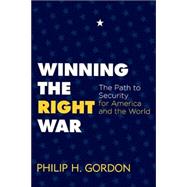
| Introduction | p. xi |
| The Wrong War | p. 1 |
| A Flawed Diagnosis | |
| Misusing Force | |
| Squandering Credibility | |
| Conflating Threats | |
| Alienating Allies | |
| The Resource Gap | |
| How We Won the Cold War | p. 37 |
| Managing Threats | |
| Preserving Our Values | |
| Winning Friends and Allies | |
| Fighting the Right Battles | |
| The Right War | p. 67 |
| Restoring Moral Authority | |
| Rethinking Homeland Defense | |
| Providing Hopes and Dreams | |
| Ending the Oil Curse | |
| Rebuilding Frayed Alliances | |
| A New Deal for the Middle East | p. 99 |
| Getting Out of Iraq | |
| Pursuing Israeli-Arab Detente | |
| Containing-and Engaging-Iran | |
| Afghanistan and Pakistan | |
| Winning Turkey Back | |
| What Victory will look like | p. 143 |
| Imagining the Future | |
| After the War on Terror | |
| Wrong War, Right War | |
| Notes | p. 163 |
| Acknowledgments | p. 193 |
| Index | p. 195 |
| Table of Contents provided by Ingram. All Rights Reserved. |
The New copy of this book will include any supplemental materials advertised. Please check the title of the book to determine if it should include any access cards, study guides, lab manuals, CDs, etc.
The Used, Rental and eBook copies of this book are not guaranteed to include any supplemental materials. Typically, only the book itself is included. This is true even if the title states it includes any access cards, study guides, lab manuals, CDs, etc.
Excerpted from Winning the Right War: The Path to Security for America and the World by Philip H. Gordon
All rights reserved by the original copyright owners. Excerpts are provided for display purposes only and may not be reproduced, reprinted or distributed without the written permission of the publisher.